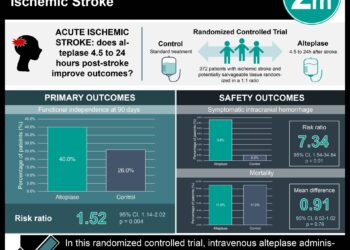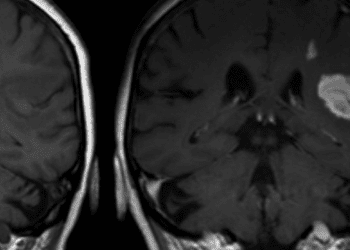Preoperatively diagnosed patent foramen ovale linked to increased perioperative stroke risk
1. A preoperatively diagnosed patent foramen ovale was associated with an increased risk of stroke within 30 days of non-cardiac surgery.
Evidence Rating Level: 2 (Good)
Study Rundown: Perioperative stroke is a significant complication of surgery that has a major impact on morbidity and mortality. In combination with hemodynamic changes and increased pro-coagulopathic states that manifest through surgery, a patent foramen ovale (PFO) may increase this stroke risk due to paradoxical emboli, though the extent of this risk has yet to be adequately determined. This retrospective cohort study looked to determine whether a preoperatively diagnosed PFO led to increased risk of ischemic stroke after non-cardiac surgery. Among over 150 000 patients undergoing general anesthesia for non-cardiac surgery, 1% had a diagnosed PFO before surgery. These patients were more than 2.5 times as likely to have an ischemic stroke compared to patients without a PFO. They were also more likely to have a large vessel territory stroke and more severe stroke-related neurological deficits.
Overall, this study suggests that a preoperatively diagnosed PFO is associated with an increased risk of perioperative stroke after non-cardiac surgery. This study is largely generalizable, as it includes a large patient population undergoing non-cardiac surgery. While the study data support an increased risk of perioperative stroke, the magnitude of the association is still unclear, as nearly 25% of the general population may have an undiagnosed PFO. Finally, the fact that patients in the PFO group were referred for testing to identify this condition suggests previous cardiovascular dysfunction, which is likely to be a confounding factor which casts some doubt on the conclusions.
Click to read the study, published in JAMA
Relevant Reading: Long-term outcomes of patent foramen ovale closure or medical therapy after stroke
In-Depth [retrospective cohort]: This study included 150 198 patients from 3 Massachusetts hospitals who underwent general anesthesia for non-cardiac surgery between 2007 and 2015. A total of 1540 (1.0%) of patients had a pre-operatively diagnosed PFO based on ICD-9 and ICD-10 codes; 850 patients in total (0.6%) had a perioperative ischemic stroke, with 49 (3.2%) in patients with PFO and 801 (0.5%) in patients without PFO (absolute risk difference 2.6%; CI95% 1.8%-3.5%). After adjustment, patients with PFO had an increased risk of perioperative ischemic stroke within 30 days of surgery (OR 2.66; CI95% 1.96-3.63). They were also more likely to have a large vessel territory stroke (RR 3.14; CI95% 2.21-4.48) and more severe stroke-related neurological deficits.
Image: PD
©2018 2 Minute Medicine, Inc. All rights reserved. No works may be reproduced without expressed written consent from 2 Minute Medicine, Inc. Inquire about licensing here. No article should be construed as medical advice and is not intended as such by the authors or by 2 Minute Medicine, Inc.









